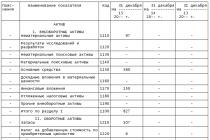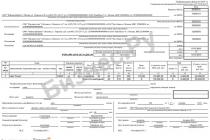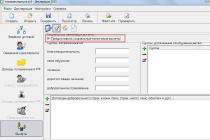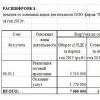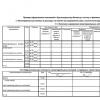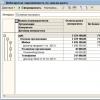The success of any enterprise is due to the well-coordinated and productive work of the staff. But when you have to work with slackers and people like them, it's hard to get a good result without additional incentive. In such cases, managers use a reprimand as a disciplinary sanction.
Labor law reprimand
According to Art. 192 of the Labor Code of the Russian Federation, a disciplinary sanction, including a reprimand, is provided for:
- failure to perform or improper performance of official duties, which are prescribed in labor legislation, job descriptions, orders of management, etc.;
- inaction of the employee in situations requiring immediate intervention.
A reprimand is a punishment that is a censure of a misconduct and is accompanied by the issuance of an order. It is classified as a punishment of medium severity: it is stricter than a remark, but softer than a dismissal (although in practice the lines are often blurred). Usually used in cases where a repeated violation threatens with dismissal.
The legislation does not specify when exactly a reprimand is announced. Whether the cause of the misconduct was justified, how serious the consequences were, whether the enterprise suffered a lot of damage and what kind of punishment to choose in general - all this is decided by the employer.
But there are 3 important things to keep in mind:
- Observe the term for imposing a penalty - 1 month from the moment the misconduct was discovered (excluding vacation days, sick leave, training period).
- If, after the announcement of the reprimand, the employee did not commit violations for 12 months, the guilt is completely removed.
- Follow the procedural requirements described in Art. 193 of the Labor Code of the Russian Federation.
Many are interested in the question: is it possible to issue a reprimand without a comment? After all, in the list of punishments, he is in 2nd place. So: the legislation does not establish a strict sequence. Therefore, the management has the right to independently choose the sanction.
When they announce a "severe reprimand"
Employers often forget that the Labor Code does not provide for any "strict reprimand" as a measure of punishment or "reprimand with registration". Officially, such phrases cannot be used - so the punishment will not have legal force. Violation of the wording can lead to the fact that when an employee contacts the labor inspectorate, the following will follow:
- fine on the basis of paragraph. 1 Article. 5.27 of the Code of Administrative Offenses of the Russian Federation;
- recognition of the order to issue a severe reprimand as a disciplinary sanction invalid.
If the organization provides incentive payments or allowances, the culprit may lose them. But when the bonus is issued without fail, the employer must issue it, despite the disciplinary offense.
Sequence of actions when issuing a reprimand
Reprimanding is a legal fact. Therefore, the procedure must be framed in accordance with the requirements of Art. 193 of the Labor Code of the Russian Federation.
In general, Russian legislation does not prescribe a specific procedure, but we recommend doing this:
| № | Stage/action | Explanation |
| 1 | Fix violation of labor discipline | They do it with the help of an act that is drawn up in the presence of other employees. In it they write about what happened and put the signatures of witnesses. |
| 2 | The immediate supervisor of the employee writes a memorandum | Usually addressed to the CEO |
| 3 | The offending employee is sent a notice with a request to provide an explanatory note | In it, he indicates the reason for the disciplinary offense. The waiting period is 2 days. If the answer is not received or the employee refuses to present his comment, an act of refusal is drawn up. |
| 4 | If the employee did not provide an explanation and the violation occurred for an unexcused reason, the reprimand is announced by the order of the employer | It prescribes all the circumstances of the misconduct and puts links to legal documents confirming the legality of the decision. In the operative part, the type of penalty is prescribed. |
| 5 | When a reprimand is announced as a disciplinary sanction (see the sample order below), an entry in the work book is not made about this | The mark is put in a personal card and / or characteristic. A photocopy of the order is invested in the personal file of the subordinate. |

The employee must be familiarized with the order within 3 days from the date the document enters into legal force.
If the employee refuses to sign, read the contents of the order aloud and draw up the appropriate act in front of witnesses.
What you need to prepare in case of verification:
- documentary evidence of misconduct;
- a copy of the notice of the request to present an explanatory note;
- explanatory note of the employee;
- refusal certificates (if necessary).
All of the above documents will help prove that the punishment was justified and the employer did not commit illegal acts. They will come in handy if the subordinate decides to apply to the labor inspectorate to appeal the decision. So the employer will be able to insure himself against unnecessary problems and financial costs for the state duty, payment of compensation.
Can an employer cancel a reprimand?
Over time, it may turn out that the employee was punished unfairly, or there was no need for this. Can he be reprimanded? Yes. Very simple. You just need to issue the appropriate order. According to Art. 194 of the Labor Code of the Russian Federation, this can be done within 1 year from the date of the announcement.
The penalty is removed not only at the initiative of the management, but also at the request of other persons. For example:
Thus, a reprimand is a penalty of moderate severity, which must be justified and documented. Only then, when applying to the court, bringing the employee to liability will be considered legal.
If you find an error, please highlight a piece of text and click Ctrl+Enter.



